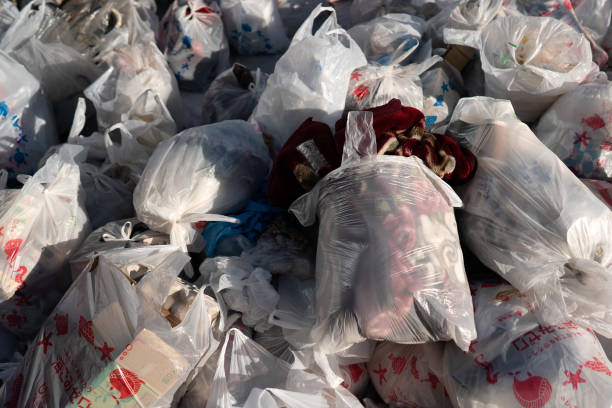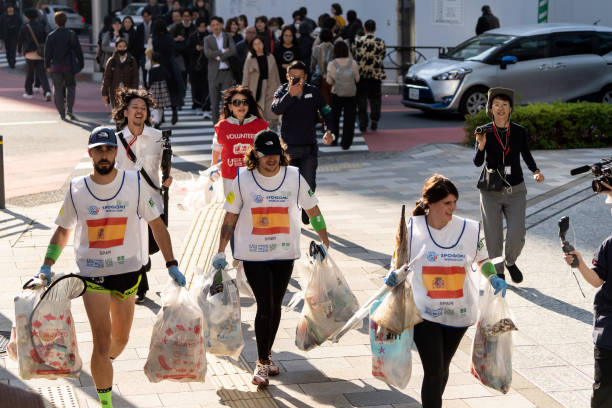Residents of a Japanese city may have to endure being publicly named and shamed if they do not follow the rules around bin separation.
Japan’s strict waste disposal regulations can sometimes seem confusing, but those in Fukushima have been told they must work harder to ensure they do not make mistakes.
Under the current system, rubbish collectors place yellow “violation stickers” on bin bags that don’t have properly segregated waste. Residents whose bags contain the warning sticker have to bring them back inside their homes and sort them again before the next collection date.
However, under the new rules set to commence in March, the Fukushima Municipal Government will place a red sticker to mark improperly sorted rubbish. If it remains unaddressed for a week, city officials will be authorised to inspect the bags to identify the culprits using their mail and other items. Offenders will be given verbal instructions to correct their mistake, followed by a written notice – and if both fail, the violators will have their names published on the official municipal government website.
While some cities in Japan, including Kyoto and Sasebo in the Nagasaki Prefecture, conduct inspections of rubbish bags and disclose the names of offending businesses, Fukushima is the first to do the same to individual residents.

To address concerns about the government invading citizens’ privacy, city officials have said the inspections will take place in a private space with no third party presence, and that “there is nothing illegal about publicising malicious waste generators who do not abide by the rules and do not follow the city’s guidance and advisory,” reported The Mainichi.
Fukushima mayor Hiroshi Kohata said: “Through this initiative, we hope to somehow correct the current situation of improper garbage disposal. We will work to promote thorough separation of garbage and reduction of waste.”
Japan is known for its meticulous garbage disposal system, which mandates different days of the week for different types of waste to be taken to a designated collection site, with the rubbish all separated into categories like burnable, non-burnable, recyclable, and organic waste. Items like electronic appliances and/or furniture have separate rules, which require citizens to make appointments so they can be collected separately.
Japan’s rigorous waste disposal system can be traced back to 1900, when the first laws came into place to improve public sanitation. After World War II, rapid urbanisation saw industrial pollution in addition to regular household trash, leading to the government being forced to enact stricter legislation to focus on waste reduction and recycling.

The notable scarcity of rubbish bins in public can add to the difficulty of trash disposal for residents. After the 1995 Tokyo subway sarin attack, most trash cans were removed from public spaces due to security concerns. Residents are now used to carrying their waste until they can dispose of it in an appropriate location, reinforcing the country’s emphasis on being responsible for their own waste.
The rules, while stringent, are aimed at facilitating easier recycling and minimising waste in landfills.
“The rules for separating garbage are set by each municipality and there are about 1,700 municipalities across Japan so there are about the same number of sets or regulations for the separation of waste,” Seiichiro Fujii, an associate professor at Daito Bunka University told The South China Morning Post earlier this year.
Fukushima’s new ordinance, passed on 17 December, is hoping to reduce the volume of garbage its residents produce, which in 2022 was 1.08 kg per person daily, higher than the national average of 880 gms. The city also saw approximately 9,000 cases of garbage that did not comply with the existing regulations.
The Fukushima Waste Reduction Promotion Division said that improper waste disposal previously not only led to garbage scattered all over, but also an increase in scavenging crows.
“The improper disposal of waste is a major concern as it deteriorates the living environment of local residents,” the department said in a statement to the BBC.
Improperly sorted waste adds to the existing landfill, which “imposes a burden on future generations”.

“Therefore, we consider waste sorting to be very important.”
Japan has also turned waste collection into a sport, with the annual Spogomi World Cup, which takes its name from the words “sport” and “gomi” – Japanese for rubbish. In 2023, the UK earned the top spot for collecting a total of 57.27kg of rubbish.







